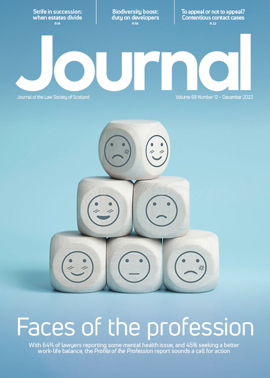A trusts law for the modern era?
Outdated trusts legislation
Trusts have been recognised in Scots law for centuries. Flexible, simple to set up, and serving many different purposes, they are still widely used, bringing great benefits for families, society and commerce. As has long been the case, trusts are used for the transmission of property, but not just for the wealthy: many wills are likely to contain trust clauses, especially where the testator has young children. The trust is also a standard way to protect the interests of the vulnerable. For example, disabled persons trusts and personal injury trusts are the normal ways of providing for disabled people or to protect compensation received after an accident. And it should not be forgotten that many charities are constituted as trusts.
In commerce, too, the trust is commonly employed. A major use is to provide security for commercial debts. Thus, debt factoring and invoice discounting, which can be vital for cash flow, especially for smaller businesses, often incorporate a trust. In commercial development agreements it is also not uncommon to find a trust, for instance to hold funds for completing snagging work or for future environmental liabilities. Thirdly, and importantly, trusts are integral to many aspects of the financial services sector: pension funds are often held in the form of a trust, as are life assurance funds. It hardly need be said that the sums involved here are enormous.
It is increasingly evident, however, that trusts have stood the test of time very much better than the relevant legislation. The last major statute, the Trusts (Scotland) Act 1921, was largely a restatement of an Act of 1867; more recent amendments have been piecemeal and have left the legislation in an unsatisfactory state.
At the end of a comprehensive review, the Scottish Law Commission has published a Report on Trust Law (SLC No 239, 2014) which seeks to reformulate trust law in Scotland in a way which meets current needs and leaves room for future development. The recommendations are reflected in a draft Trusts (Scotland) Bill appended to the report.
Modernising provisions
The report makes extensive recommendations, over 100 in all, across the whole face of trust law. They are reflected in the 82 sections of the draft bill.
At first glance, this appears daunting. Yet many of the draft bill’s provisions aim to restate, in modern terms, what is already familiar. Thus the administration of trusts (appointment, resignation, removal and discharge of trustees; and decision making) is covered, along with trustees’ powers and duties, and the court’s power to vary trusts. The clarity of the restatement will allow trustees to discharge their obligations more effectively. Given that the office of trustee is traditionally a gratuitous one, and that it is also onerous, there is an evident benefit in the relevant legislation being presented in a way which is as clear and accessible as possible.
The majority of the provisions are default ones and the aim is to align the law with current practice. Thus practitioners, including those who are not specialist trusts lawyers, may take advantage of the default provisions without having to draft lengthy deeds. The advantage of this cannot be overstated, as legislation which is either hard to find or difficult to understand (as the 1921 Act has become, with its over-long sentences and many amendments) serves nobody well. Many other jurisdictions have recently passed new, clear trusts statutes and Scots law here looks increasingly inadequate and outdated.
In contrast to the provisions which restate and modernise the current law, some of the recommendations in the report are brand new. Four of the most notable are (in bare outline):
- Trusts will be freed from the current complex rules on the accumulation of income. Equally, the rules against successive liferents will go. As a counter-balance, for trusts with a lengthy duration the court will have the power to alter their trust purposes if, after at least 25 years have passed since their creation, there has been a material change of circumstances which the court is satisfied justifies an alteration. In this way, trusts of long duration will be capable of being modified, to the minimum degree which is necessary, should their purposes become misaligned with future circumstances, particularly with respect to beneficiaries. (This will not apply to commercial trusts or public trusts, nor to private purpose trusts, which are discussed next.)
- Private purpose trusts will be expressly permitted. Arguably, they are already competent under Scots law (unlike elsewhere in the UK). This type of trust, which exists to serve a specified purpose rather than to benefit a class of beneficiaries, is likely to be of particular value in commerce. For example, parties to a land development might want to put aside funds in trust against the possibility of future claims under environmental legislation. Provision is also made for the appointment of a supervisor (sometimes called an “enforcer” in other jurisdictions), whose role is to oversee the trustees’ performance in promoting the trust purpose. (These trusts are to be distinguished from charitable ones, which are also “purpose trusts”. The difference lies in the fact that charities must have a public purpose, whereas the proposal is for trusts which are private in nature.)
- Protectors will be expressly permitted as an option for trusters. The office of protector, which exists in many other jurisdictions, is to ensure that the interests and wishes of the truster are properly taken into account by the trustees.
- The remedy for curing defects in the trustees’ exercise of their fiduciary powers will be made clear. Can a court strike down a defective decision taken by trustees (or grant interdict, in respect of an anticipated future decision)? This is an area in which there has been much litigation in England & Wales, culminating in a UK Supreme Court decision in 2013 (Pitt v Holt; Futter v Futter [2013] UKSC 26, decided by a seven judge bench.) The recommendation for Scots law takes a different approach to that south of the border and builds on existing Scottish House of Lords authority. Under it, the court will have power to reduce a decision taken by trustees in specified circumstances, e.g. where they failed to apply their minds to the correct question, or considered the wrong question, or acted perversely or unreasonably. Interdict will also be available for an anticipated future decision.
In addition, there are some areas of trusts law which are presently vague and uncertain but for which statutory provision is proposed. One example is that of ex officio trustees. They are relatively common in certain types of trust, especially in some long-established private trusts, public trusts, and educational endowments. For a whole variety of practical reasons, an ex officio trustee may be unable or unwilling to fulfil the duties of trustee. This causes varying degrees of difficulty for the remaining trustees and, in some cases, is a very serious barrier to the good functioning of the trust. What is recommended is a statutory power for trustees, under the supervision of the court, to make necessary changes to address the particular difficulties which they face.
A further area of uncertainty concerns the flow of trust information, principally between trustees and beneficiaries. This is a topic on which there has been high profile litigation in some other jurisdictions and on which there is little guidance in Scotland. The draft bill seeks to put in place a broad framework for the provision of information, with an express court power to resolve disputes if necessary.
Alternatives to reform?
This article has already set out three important reasons for reform:
- First, the current legislation is outdated and increasingly obscure. This is unsatisfactory for those wishing to use it (whether trustees, professional advisers, or the courts).
- Secondly, trusts play a vital part in many areas of domestic life and also in commerce and the financial industry. There is obvious benefit in their being supported by an effective and modern statutory regime which is kept under periodic review.
- Thirdly, the trusts market is increasingly international. Many of the assets which are commonly put into trust, particularly money and shares, are readily moved across national borders and can be put into trust in other countries. To retain (and win) business, a jurisdiction needs to have legislation which is competitive and which meets modern needs. The present recommendations have taken this concern to heart and bring to Scots law a number of internationally recognised benefits.
In addition, a number of foreign jurisdictions which do not have a history of trusts in their domestic law (including some civil law countries on the Continent), are showing interest in the trust. Scots law, as a mixed legal system, is of particular importance here and the influence of changes to our own trust law may well be felt internationally. This could be especially relevant at a time such as the present when trusts do not enjoy a universally good press and are seen by some, including some legislators, as an insufficiently transparent way for the wealthy and the shady to hold money and other property.
Of course, one option would simply be to ban trusts, or to place stringent restrictions on their use. Many, however, would see this as throwing the baby out with the bathwater. It would harm those in Scotland who currently rely on them for what would be widely regarded as socially and commercially beneficial purposes, examples of which have already been given. And it would be largely ineffective as it would do nothing to prevent determined trusters setting up a trust under any of the many other jurisdictions where trusts are well established. (It would also raise difficult questions about trusts which arise by operation of statute, for example in relation to client moneys.)
The status quo is another option: simply leave the law as it is on the basis that it (generally) works and is (more or less) familiar to those who need to use it, at least to those who use it on a regular basis. While superficially attractive, this would be a misguided choice. Rather like the engine under our car bonnet or the software in our computer, much legislation requires periodic inspection, repair or replacement. This principle applies as much to controversial, politically sensitive legislation as it does to more mundane statutes. “Much law is like plumbing: useful but unexciting and seldom thought about except when it goes wrong”, as the SLC Report on Land Registration (SLC No 222, 2010) says in its opening paragraph. Trust law, like land registration, is essentially of the “plumbing” variety. The current system, with its main statute almost 100 years old, cannot be expected to continue to function effectively and to modern standards without an overhaul. To do nothing is merely to postpone the inevitable.
In preparing its recommendations, the Scottish Law Commission has consulted widely. There has been strong and consistent support for the updating and modernisation of trusts law, and this has continued after publication of the report, for example at a STEP Scotland event last November. The modernisation of the law will be of direct benefit to trusters, trustees and their professional advisers, but will also be of much broader benefit, including to the Scottish economy. Further support to make the draft legislation into an Act of the Scottish Parliament is needed, and the Commission hopes that the Scottish Government will introduce a bill into the Parliament in the near future. That is the next goal on the path to effective law reform.
In this issue
- Sham marriages v Sham interviews: which is the greater evil?
- A trusts law for the modern era?
- When cash just isn't good enough
- Un voyage en vaut la peine*: SYLA does France
- SYLA ends season on a high
- Appreciation: John Henderson
- Reading for pleasure
- Opinion: Mohammed Sabir
- Book reviews
- Profile
- President's column
- People on the move
- Application forms: should the seller adjust?
- When sharing matters
- After the launch
- Game of strategies
- Broken promises
- Charity legacies: the 10% conundrum
- Another "Whose money?" case
- Barrister barred
- Rearranging the family ties
- Belief in the system
- Living by the code
- The sky's the limit
- Unfinished business
- Law reform roundup
- Appreciation: Joseph Beltrami
- LBTT: what does it mean in practice?
- For those of a certain age
- Claims: trending?
- Ask Ash
- A man for all reasons
- The "TER approach"






